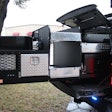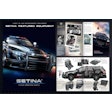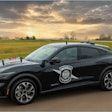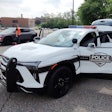Responding to concerns about carbon monoxide exposure to officers using Ford Police Interceptor Utility patrol SUVs, Ford said today the issues experienced by some law enforcement agencies are a result of improperly sealed holes in the body of the vehicles that were created during the process of upfitting them for police duty.
Bill Gubing, chief engineer for the Ford Explorer program, said the company has sent task forces out to investigate the carbon monoxide incidents, and the company's specialists have found open holes and uncovered spaces in the rear of the vehicles. Gubing explained that the aerodynamics of the Ford Explorer design causes air to swirl at the back of the SUV, which pushes the gas into the openings. He added the carbon monoxide problem does not occur in police sedans because the gas is captured by the trunk and does not enter the cabin.
Ford produces a modifiers guide to be used by the upfitters, but Gubing said some are not following the instructions. "It's safe to say [the modifications] were not done as good as they could have been," he said.
During a Web briefing, Gubing showed numerous photos of open holes at the rear of the vehicles, including their undersides, where upfitters had run control and power wires for lights and other police systems and had not sealed them properly. He said the problems can be remedied by sealing the holes with mastic and special foam gaskets.
Ford is covering the cost for these repairs, regardless of the age of the vehicle, its mileage, or who is responsible for the body leaks. He said Ford teams are working closely with agencies getting their affected vehicles back on the road.
Gubing said Ford is also working with the National Highway Traffic Safety Administration (NHTSA) regarding concerns that exhaust manifolds have been cracking on Explorers. He said no evidence has been found of cracks in the manifolds, and there have been no reports of carbon monoxide issues with consumer Explorers.
Law enforcement agencies concerned about carbon monoxide leaks in their Ford Police Interceptor Utility SUVs can contact their local Ford dealers for repairs. Ford has also set up a hotline at (888) 260-5575 to answer questions about the issue.
Gubing said that even though some reports of carbon monoxide issues with the Ford Police Interceptor Utility SUVs have been reported, the problem is not common. "The vast majority of vehicles out there do not have this issue," he said. —David Griffith
















